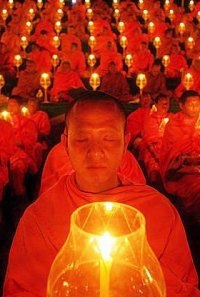
Pali is an extinct language, but the original language of the Theravadin Buddhist scriptures and the closest we have to the dialect spoken by the Buddha himself. It has no written script of its own, so every country that has adopted Theravada Buddhism has used its own script to transcribe it. This book is a free guide to the traditional chanting as it is practiced in the Thai-Theravada tradition. The book has been published by The Dhammayut Order, download it here (295 pages/700 Kb):
 A Chanting Guide
A Chanting Guide
What is The Dhammayut Order?
The Dhammayut Order, also known as the Thammayut Nikaya, is a monastic sect of Theravada Buddhism. It is primarily found in Thailand and Cambodia, although it also has followers in other Southeast Asian countries. The order was established in the 19th century as a reform movement within the broader Theravada tradition. The Dhammayut Order emerged in response to what some monks saw as a decline in monastic discipline and practice. Its founder, King Mongkut (Rama IV) of Thailand, sought to revive the strict observance of the monastic rules as outlined in the Pali Canon, the authoritative scriptures of Theravada Buddhism. He wanted to create a more rigorous and purist monastic tradition that focused on meditation and scriptural study.
Emphasis on monastic discipline
The Dhammayut Order places a strong emphasis on monastic discipline, meditation, and the study of Buddhist scriptures. Its practitioners follow a strict code of conduct and adhere to the Vinaya, the monastic rules and regulations. They engage in intensive meditation practices, seeking to attain deep states of concentration and insight. The Dhammayut monks often lead a solitary and austere lifestyle, dedicating themselves to the pursuit of spiritual liberation. While the Dhammayut Order is a distinct monastic sect within Theravada Buddhism, it coexists with another major Thai Buddhist sect called the Mahanikaya Order. The Mahanikaya is a more traditional and inclusive sect, encompassing a larger number of monks and temples. Despite their differences, both sects share the same fundamental teachings of Theravada Buddhism.
Reformation of Thai Buddhism
The Dhammayut Order has had a significant impact on the development of Buddhism in Thailand. It played a crucial role in the modernization and reformation of Thai Buddhism, promoting a more disciplined and contemplative approach to practice. The order has also influenced the spread of Theravada Buddhism beyond Thailand, with some of its teachings and practices being adopted by monastic communities in other countries.

